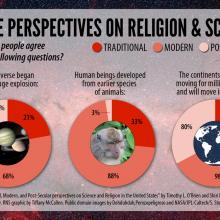sociology
Meet the “Post-Seculars” — the one in five Americans who no one seems to have noticed before in endless rounds of debates pitting science vs. religion.
They’re more strongly religious than most “Traditionals” (43 percent of Americans) and more scientifically knowledgeable than “Moderns” (36 percent) who stand on science alone, according to two sociologists’ findings in a new study.
“We were surprised to find this pretty big group (21 percent) who are pretty knowledgeable and appreciative about science and technology but who are also very religious and who reject certain scientific theories,” said Timothy O’Brien, co-author of the research study, released Jan. 29 in the American Sociological Review.
Put another way, there’s a sizable chunk of Americans out there who are both religious and scientifically minded but who break with both packs when faith and science collide.
Maybe religion really is the opiate of the masses – just not the way Karl Marx imagined.
A University of Washington study posits that worship services at megachurches can trigger feelings of transcendence and changes in brain chemistry – a spiritual “high” that keeps congregants coming back for more.
“We see this experience of unalloyed joy over and over again in megachurches. That’s why we say it’s like a drug,” said James Wellman, an associate professor of American religion who co-authored the study.
The study, “‘God is like a drug’: Explaining Interaction Ritual Chains in American Megachurches” was presented on Sunday at the annual meeting of the American Sociological Association in Denver.
Biblical literalism, and the corresponding idea of the inerrancy of scripture, has been bumping up against the sciences for a long time.
Way back in the Renaissance, the church insisted that the Bible taught that the sun revolved around the earth, and charged Galileo with heresy for claiming otherwise. Today, the debate between the Bible and natural science continues, most notably in the evolution/creation debate.
While discussions of religion and science usually revolve around conflicts with natural science, I'd like to propose that the place we really should be placing our attention is the relationship between faith and the social sciences.
As our understanding of all science grows, it becomes harder and harder to maintain the position of biblical literalism without seeming absurd.
Maybe we haven't all heard the thunder clap yet, but the lightning bolt struck a while ago. We are going to have to adjust our reading of the Bible to coincide with a modern scientific understanding of the universe. In broad strokes, that shift has already happened.
As I stated in an earlier blog post, the juxtaposition of reading Philip Gulley's book http://www.amazon.com/gp/p
With the bicentennials of Abraham Lincoln and Charles Darwin the subject of numerous conferences, articles, and television shows this month, we also should remember another important commemoration in 2009: the centennial of the founding of the National Association for the Advancement of Colored People (NAACP).


